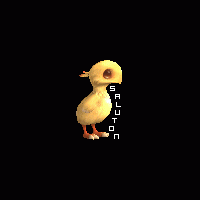Out of curiosity...why not Ido?
Aubright-tól, 2013. január 1.
Hozzászólások: 56
Nyelv: English
Tempodivalse (Profil megtekintése) 2013. január 2. 17:36:56
I think my view of Ido can be summarised simply by saying that it is contradictory. On the one hand it aims to simplify. On the other, it introduces irrelevant grammatical and lexical distinctions.
Esperanto is not as simple or easy as it could be. But it straightforwardly tries to present simplicity to the learner, without getting distracted. (I like Volapük for this reason as well.)
bartlett22183 (Profil megtekintése) 2013. január 2. 18:36:02
Tempodivalse:At least with EO, you know that once you learn a spelling/pronunciation rule, you'll never have to worry about exeptions.Well, exactly the same principle is true, unambiguously and without doubt or hesitation, of Ido. In Ido, there are no exceptions. None. Period. It is just that the rules are different from those of Esperanto, and not any more burdensome in any meaningful way. (As one poster here remarked, 'ch'/'sh' are no more burdensome than their workarounds 'ch'/'sh' (allowed in the Fundamento) or 'cx'/'sx' used by some E-ists.)
I am not here stumping for Ido, but I am familiar with it. I subscribe to two mailing list conducted entirely or mostly in Ido. My long familiarity with the constructed international auxiliary language field has led me to the unmistakable conclusion (as it has many others) that it is not "raw" linguistic characteristics that determine the relative success or lack thereof of a language. There are other factors which are more determinative. I speculate that if Ido had been the first competitor to Volapük rather than Esperanto (i.e., if E-o had not "gotten there first" ), then most people here would be using Ido.
Roberto12 (Profil megtekintése) 2013. január 2. 19:24:20
I will add that for all the time I've spent/wasted (delete as appropriate) thinking about this stuff, I can't think how to reform Esperanto without ruining it. Replacing mal- (maybe with des-), correcting the "sexism", and making the accusative ending optional, are about as far as I can go. Abolishing the definite/indefinite distinction is another possibility.
And I think it's a shame that Idiom Neutral hasn't amounted to anything, because with a reform (always reforms!) I think it could've been an outstanding candidate for the IAL.
Oijos (Profil megtekintése) 2013. január 2. 20:13:46
It will be so called worldlang.
worldlang
sudanglo (Profil megtekintése) 2013. január 2. 20:50:37
One cannot speak of 'dethroning' Esperanto. It does not yet occupy the throne. It is merely a contender.
In any case, the greatest threat to Esperanto is the arrival of superior and convenient machine translation. No jumped-up IAL project comes anywhere close to unseating Esperanto from its current position.
Vilius (Profil megtekintése) 2013. január 2. 21:45:42
sudanglo:In any case, the greatest threat to Esperanto is the arrival of superior and convenient machine translation.I do believe (or more precisely - hope) we will have such computers at some point in history. Yet I wouldn't hold my breath. Whenever you see "AI-complete" next to some application, read "not in my lifetime", even if you were a toddler

Tempodivalse (Profil megtekintése) 2013. január 2. 22:26:24
sudanglo:In any case, the greatest threat to Esperanto is the arrival of superior and convenient machine translation.Considering that the English -> Russian Google Translator still fails to make elementary distinctions between the grammatical cases, I'd say this is still a ways off (although to be fair, the quality of these translators is improving markedly).
Oddly, I don't see EO as "sexist". The way I see it, Esperanto has two genders: feminine and non-feminine. That is surely less sexist than having a masculine and non-masculine gender
 I do agree that "mal-" was an unfortunate choice by Zamenhof, but remember that its negative connotation is limited mostly to western European languages.
I do agree that "mal-" was an unfortunate choice by Zamenhof, but remember that its negative connotation is limited mostly to western European languages.The one thing that gets me sometimes is "la" -- as someone who has studied Spanish, I find constructions like "la viro" a little odd, even though I know that's not the case -- but I would have preferred "le", or just to elide (which you can do anyway). But that's peanuts.
marcuscf (Profil megtekintése) 2013. január 2. 23:09:10
bartlett22183:Well, nothing has exceptions if the rules are complex enough...Tempodivalse:At least with EO, you know that once you learn a spelling/pronunciation rule, you'll never have to worry about exeptions.Well, exactly the same principle is true, unambiguously and without doubt or hesitation, of Ido. In Ido, there are no exceptions. None. Period. It is just that the rules are different from those of Esperanto, and not any more burdensome in any meaningful way. (As one poster here remarked, 'ch'/'sh' are no more burdensome than their workarounds 'ch'/'sh' (allowed in the Fundamento) or 'cx'/'sx' used by some E-ists.)
To me, the radio × omnadie problem (rádio × omna-díe with accents or radjo × omnadie with Esperanto spelling) brings enough doubt and hesitation during the learning process.
Maverynthia (Profil megtekintése) 2013. január 3. 1:48:23
I've actually heard non-Euopean people say that Esperanto is a problem because it's Eurocentric, however without alternatives, they shrug and give up. I think very much that if a new non-Eurocentric international language was developed, it'd be rejected as being "too foreign, too exotic, too hard, too ethnic" and other excuses.
erinja (Profil megtekintése) 2013. január 3. 2:16:30
Roberto12:Something I wonder about is if the Ido incident ruined what could've been a significant reform of Esperanto. The contrast between Arie de Jong's reform of Volapük in the 1920s and the non-reform of Esperanto in the 1900s, is as extreme as could be. De Jong, with the support of the community, produced a superior new version of the language that was accepted no-problemo, and survives to this day with not a word of complaint. Contrast that with the explosive failure of Ido that still troubles people even in the 21st century.I think the main difference is that Volapuk was practically dead when de Jong did his reform. The Volapuk community knew that it was reform or die, because they had already lost so many speakers to the new Esperanto movement. de Jong's reform was their last ditch attempt to stay alive, and it did succeed in keeping the community around, though of course on a smaller scale than previously. I don't think Ido's situation was really comparable, there wasn't any kind of massive crisis in Esperanto at the time.






